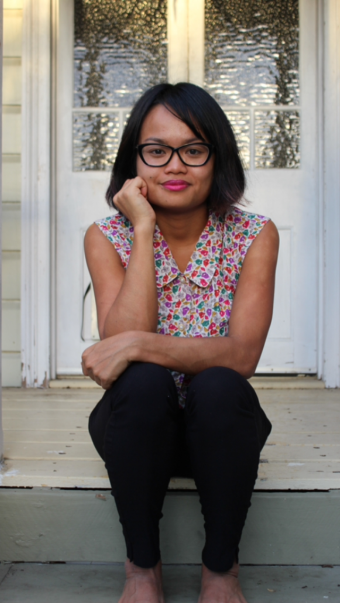She who “happens to be” a (non-white) Third World member, a woman, and a writer is bound to go through the ordeal of exposing her work to the abuse of praises and criticisms that either ignore, dispense with, or overemphasizes her racial and sexual attributes. – Trinh T. Minh Ha.
 How does one respond to this ordeal that Vietnamese-American artist, Minh-Ha speaks of? Do we accept, submit, collude, or do we resist, protest and defy? These were some of the key questions playing on my mind as I was listening to four inspiring Asian-Australian women artists talk about the intersections between race, ethnicity, culture and the arts at the 2015 BrisAsia Festival event, Yum Chat.
How does one respond to this ordeal that Vietnamese-American artist, Minh-Ha speaks of? Do we accept, submit, collude, or do we resist, protest and defy? These were some of the key questions playing on my mind as I was listening to four inspiring Asian-Australian women artists talk about the intersections between race, ethnicity, culture and the arts at the 2015 BrisAsia Festival event, Yum Chat.
I must admit, there was something strangely comforting and solidarity making about being in the presence of women whose achievements are evidence of their transgressions of boundaries and norms that constrain Asian-Australian women. Their individual stories of struggle and achievement validated my own stories. Their experiences of being exoticised, stereotyped, and discriminated reaffirmed to me that my struggles were shared. And the reclamation of their ‘Asianess’ and difference stirred a sense of pride and self-love that has often been elusive.
Despite these moments of shared connection, I left Yum Chat feeling not quite satisfied.
Notably absent was a structural and intersectional analysis of privilege and oppression. In the world we live in, it is unimaginable that women artist/writer of colour could simply travel through her personal and professional life unscathed by structural oppression.
I was left wondering about the rituals she had to undergo, the acts she had to perform, the unwritten conditions that she had to fulfill to gain permission or access to simply perform art. I was yearning for a critical interrogation of the art industry’s role in enabling and perpetuating, as bell hooks would say, the white supremacist capitalist patriarchy. And I was desperate to hear how women with similar identities to myself extracted themselves from the white male gaze in their art and in their workplaces.
Whilst I left the event hungry for a more rigorous critique from the artists, my own experiences as a young Vietnamese-Australian woman working in the fields of community development and anti-violence work quickly reminded me of the complexities that come with speaking up and out about experiences of oppression in public or at work.
I am triggered by memories of times when I did not do enough to halt organisational practices that were contributing and enabling racist, heterosexist and classist ideas. I am triggered by memories of feeling uneasy with agreeing to partnerships that pandered to the views of a group of conservative parties at the expense of solidarity with the oppressed. I am triggered by my sense of complicity in enacting privilege and dominance for the times where I addressed racism in a way that was white-washed.
In a political climate of privileged individualism, we can be easily seduced into judging ourselves and other women of colour for their failures to speak up. But this focus on individual blame and responsibility only serves to obscure the effects of assimilation ideologies on migrant communities of colour in Australia and minimise the responsibility of those in positions of privilege and power to remove the barriers that stops women of colour from speaking out.
Further this narrative of ‘failing to speak up’ falls straight into the hands of the tired stereotypes of Asian women being quiet, docile, subordinate, apolitical and unassertive. Other than being narrow and essentialist, these representations have a direct impact on Asian-Australian women’s access to power.
Through my own experience, I am constantly aware that the stereotype of the passive sweet ‘Oriental Woman’ makes it hard for me to claim a voice in the radical feminist and political spaces I inhabit. I feel like I have to constantly measure up to the standard feminist, one who is fearless, outspoken and robust.
Women of colour are recursively told to show up and speak up by white women. Telling us that we ought to speak up assumes that we have the same access to power as white women. What becomes concealed in this factitious story of equality is that unlike white women, Asian Australian women have been pervasively defined by a history of forced sex work, colonialism and western imperialism. This history determines who gets listened to, who gets on the board of committees, who is invited to speak, whose voices weigh more, and whose politics are deemed more radical.
The point of labouring on about history, representation and oppression is not to lead us into a fatalistic trap or an abyss of despair where there is no hope or purpose for change or action. It is rather to animate a discussion on the complexities of power and resistance. These issues call on us to straddle the tensions between structure and agency in a way that does not present a heroic, romanticised narrative of human agency but also does justice to honouring the struggle and courage of women and communities of colour who prevail in the face of adversity and injustice.

